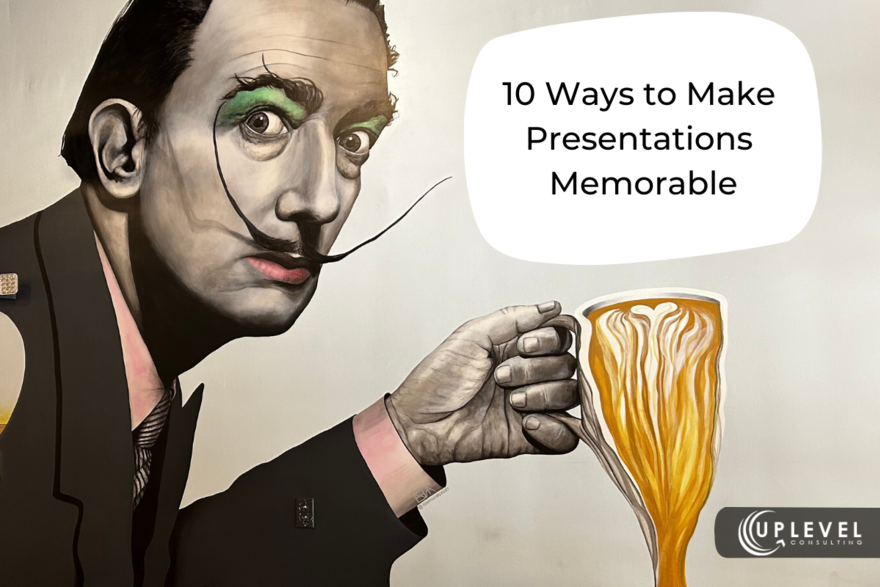10 Ways to Make Presentations Memorable: Plus 5 tips on how to prepare for your next speaking opportunity

"I'm afraid we are going to bore them to death!" That was what one business development manager told me about her CEO, who has a big speech to give soon.
When you have an opportunity to speak in front of a group, you have the opportunity to build trust, provide value and establish authority. If the CEO presents a boring, long, dry presentation how will the audience respond?
Chances are they'll walk away thinking, "YAWN! What a snooze fest!" Creating that perception misses the goal completely.
Here are a few tips on how to craft more memorable messages that help you leave a positive, lasting impression.
- Never Recycle! Tailor your message to resonate with your specific audience. Understand their needs, interests and values and position your message accordingly. Every time you speak to a new group, think of who is in the audience before your craft your message.
- Be Verbally Visual: Use vivid and descriptive language to paint a mental picture in your audience's minds. Engage their senses by incorporating sensory details and metaphors. This will help your message stand out.
- Keep it Consistent: A speaking opportunity is no time to coin a new phrase. Instead pull from your brand promise, slogan or tag line. Use ongoing relevant messages to enforce your brand. Consistency communicates trust.
- Use Emotional Appeal: Tap into your audience's emotions by incorporating storytelling, personal anecdotes or relatable experiences. Emotionally resonant messages are more likely to be remembered.
- Stay Simple to Stick: Avoid complex jargon or overly technical language. Be straightforward and aim for clarity and brevity in your sentence structure. This way you'll be easily understood and your message will stick.
- Grab them Upfront! Have a strong opening. Give careful consideration to how you will begin. Will there be an introduction? Will you speak after another speaker? Start off strong with a compelling hook like a question or a story that you've prepared.
- Take a Unique Angle: Find a fresh perspective or angle that differentiates your message from others. Presenting information in a novel way can make it more memorable and stand out in people's minds.
- Repetition, Repetition, Repetition: Repeat key points or phrases throughout your message to reinforce the main ideas. Repetition helps with retention and reinforces the importance of your message. As I used to say when teaching public speaking, tell them what you're going to say, tell them and then tell them what you told them.
- Humor if you Dare: An audience loves to laugh. If humor is appropriate to your topic and you think you can pull it off (it's a skill, for sure)... then add a little levity to your talk. Tread lightly though, you want to be sure not to put people off but instead bring them together with something most would find humorous.
-
Answer What's Next: End your message with a clear and concise call to action. Specify what you want your audience to do next, whether it's to make a purchase, share the message, or take some other desired action. As an audience to anything (podcast, videos, speeches, etc) we have come to expect this. If we don't hear you say what we should do next, we are left wondering... what was this all for? Answer the question for your audience.
Being memorable as a speaker requires preparation. Did you know that Steve Jobs used to meticulously practice for more than 6 hours for the product launch speeches he gave? After hours of preparation he'd continue rehearsal in the room where he would later speak.
Is he memorable as a speaker? Heck yeah he is! We're still talking about his now legendary performances.
If you want to create memorable presentations, you need narratives (a.k.a stories). As Noble prize winning economist Daniel Kahneman said, “No one ever made a decision because of a number. They need a story.”
Next time you schedule a speaking opportunity, here are my tips on how to tackle your preparation:
- Write your speech out to get your thoughts on paper. Then edit until it flows.
- Speak it out loud at least 6 times.
- As you practice, edit, edit, edit. Verbal communication is different than written. This will likely come naturally.
- Create notecards of your talk with bullet points ONLY. (This is tough, don't worry about getting all your written words out exactly as written. Instead focus on structure so your audience can follow along easily.)
- At this point (and not before)... add visuals (i.e. PowerPoint with video clips and other visuals to illustrate your message).
Being an unforgettable speaker requires practice and refinement. Experiment with different techniques, get feedback and you will continually improve.
If you could use some support in preparing your next talk, get in touch by sending an email here.

0 comments
Leave a comment
Please log in or register to post a comment